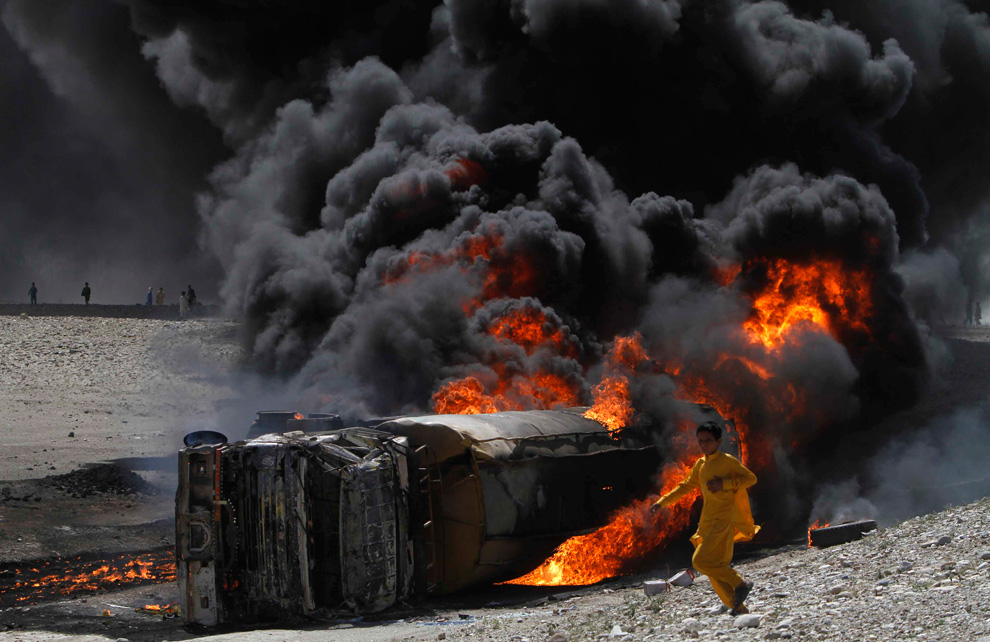
U.S. Afghanistan Campaign Faces Fuel Supply Pressures in Kyrgyzstan
Reading time: (Number of words: )
Afghanistan is known for its forbidding terrain. Add to that the abrupt change of government in nearby Kyrgyzstan earlier this year, compounded by flooding and the recent supply routes blockage in Pakistan, and even the most casual observer can understand how difficult it is to deliver supplies to U.S. forces in the region.
“U.S. and NATO forces have always existed at the bottom of the logistical barrel,” said Larry Goodson of the Strategic Studies Institute at the U.S. Army War College.
One supply depot in particular struggles against — yet somehow overcomes — these odds: the Manas Transit Center near Bishkek in Kyrgyzstan.
For a variety of reasons, the Pentagon is considering installing new fuel contractors. But experts, including some in the Defense Department, agree the supply chain and the Manas location are crucial for the U.S. effort in Afghanistan and would prove very costly to replace.
In mid-April, U.S. Defense Secretary Robert Gates said that while there are alternatives to Manas Transit Center, he was hopeful that the U.S. will continue to use the base for supplying Afghanistan. Why? Because alternatives to Manas would be more expensive and represent a seriously increased logistical challenge, Gates said.
Indeed, since the American military was evicted from Uzbekistan’s Karshi-Khanabad (K2) airbase in 2005, Manas is the last affordable U.S. base of operations in the region.
“Losing the Manas air base would be serious. We can go on, but it wouldn’t be pretty,” said Stephen Blank, also of the Strategic Studies Institute.
The interim government installed in Bishkek said it would honor the Manas lease agreement with the U.S. But Kyrgyz authorities have announced an investigation of the fuel supply contracts to Manas. According to the Kyrgyz government, the son of the former president, Maksim Bakyev, controlled companies that sold fuel to Manas contractors as an indirect way for the Pentagon to pay the former ruling family for continuing American access to the base. A subcommittee of the U.S. Congress is also investigating.
But — so far at least — no proof or documentation in support of these allegations has been offered.
The U.S. Embassy in Bishkek has stated that the most recent one-year fuel supply contract “was awarded to Mina Corporation in August 2009 in accordance with both U.S. and Kyrgyz law.”
Nonetheless, the outlook for supplies worth billions of dollars has been cast into doubt.
For several years, the main fuel suppliers at Manas and Bagram have been Mina Corporation and its affiliate, Red Star Enterprises Ltd. The two companies are contractors for the U.S. military supply organization, the Defense Logistics Agency (DLA).
Red Star and Mina have denied having links with the former Kyrgyz ruling families, the Akayevs and Bakiyevs. According to DLA, the companies continue to reliably deliver fuel and bid for contracts as suppliers to the U.S. Defense Department.
DLA says that a change of suppliers would not disrupt supplies. But the reality on the ground is more sobering, military and regional experts say.
"A switch of suppliers would cause a disruption in supplies," Blank said.
"What’s working now in terms of fuel supplies has the benefit of functionality as opposed to the potential downside of alleged corruption," Goodson agreed.
An even worse result from tinkering with this vital logistical chain would be the loss of access to the Manas outpost. If it were to disappear, the U.S.’s geopolitical interests in Central Asia would be undermined by rising Russian domination and a thriving black market.
Moscow, which sees the region as its sphere of influence, at one point pressured Bishkek, who, in turn, threatened to close the base for American use. The Kremlin has long coveted Manas and in 2003 opened its own nearby military base at Kant.
"The Russians have always been happy to have their arms around the fuel supply to the U.S. military campaign in Afghanistan," Goodson said. He asserted the Kremlin may well use the threat of closing Manas to make more money or extract concessions regarding other Eastern European issues, despite formally opposing re-exporting of Russian fuel into Afghanistan.
And from the U.S. point of view, one thing is clear. "The possible switch of supply lines or the loss of Manas imperils the project in Afghanistan," Goodson said.
The author is a freelance journalist based in Miami.

Poems for the Hazara
The Anthology of 125 Internationally Recognized Poets From 68 Countries Dedicated to the Hazara
Order Now








